Homophony - Study guides, Class notes & Summaries
Looking for the best study guides, study notes and summaries about Homophony? On this page you'll find 93 study documents about Homophony.
Page 3 out of 93 results
Sort by
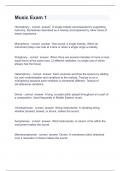
-
Music Exam 1 Question and answers rated A+
- Exam (elaborations) • 7 pages • 2024
-
Available in package deal
-
- $11.99
- + learn more
Music Exam 1 Question and answers rated A+ Music Exam 1 Homophony - correct answer A single melody accompanied by supporting harmony. Sometimes described as a melody accompanied by other tones of lesser importance . Monophony - correct answer One sound, a single melody. When an instrument plays one note at a time or when a singer sings a melody. Polyphony - correct answer When there are several melodies of more or less equal focus at the same time. (3 different melodies, no single...
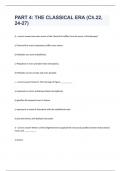
-
PART 4 THE CLASSICAL ERA (Ch.22, 24-27)questions n correct answers 2023/2024
- Exam (elaborations) • 21 pages • 2023
- Available in package deal
-
- $17.99
- + learn more
PART 4 THE CLASSICAL ERA (Ch.22, 24-27)d - correct answer How does music of the Classical Era differ from the music of the Baroque? a) Classical-Era music emphasizes artifice over nature. b) Melodies are more embellished. c) Polyphony is more prevalent than homophony. d) Melodies are less ornate and more periodic. c - correct answer Mozart's The Marriage of Figaro __________. a) represents a return to Baroque ideals of polyphony b) glorifies the imperial court in Vien...
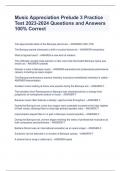
-
Music Appreciation Prelude 3 Practice Test 2023-2024 Questions and Answers 100% Correct
- Exam (elaborations) • 5 pages • 2023
-
Available in package deal
-
- $10.99
- + learn more
Music Appreciation Prelude 3 Practice Test Questions and Answers 100% CorrectMusic Appreciation Prelude 3 Practice Test Questions and Answers 100% CorrectMusic Appreciation Prelude 3 Practice Test Questions and Answers 100% Correct The approximate dates of the Baroque period are: - ANSWER- The Baroque period witnessed a shift in musical texture to: - ANSWER-homophony What is figured bass? - ANSWER-a new kind of notation The artificially created male soprano or alto voice that domi...
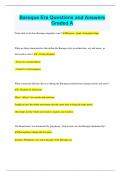
-
Baroque Era Questions and Answers Graded A
- Exam (elaborations) • 6 pages • 2023
- Available in package deal
-
- $9.99
- + learn more
Baroque Era Questions and Answers Graded A From what word does Baroque originally come? Barroca - pearl of irregular shape What are three characteristics that define the Baroque style in architecture, art, and music, as discussed in class? - Overly dramatic - Excessive ornamentation - Control vs. Extravagance What connection did they discover during the Baroque period between human moods and music? - Doctrine of Affections Music "affects" our moods and emotions Sought to have the whole movem...
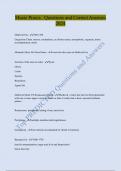
-
Music Praxis Questions and Correct Answers 2024
- Exam (elaborations) • 13 pages • 2024
-
- $7.99
- + learn more
Medieval Era - 500-1450 Gregoarian Chant, masses, troubadours, no distinct meter, monophonic, organum, drone accompaniment, motet Machaut's Mess De Notre Dame - wrote the first mass in Medieval Era Sections of the mass in order - Kyrie Gloria Credo Sanctus Benedictus Agnus Dei Medieval Motet VS Renaissance Motet - Medieval: a tenor line derived from plainchant with one or more upper voices in french or latin. Usually had a short, repeated rhythmic pattern Renaissance: polyphonic...
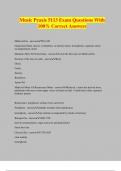
-
Music Praxis 5113 Exam Questions With 100% Correct Answers
- Exam (elaborations) • 9 pages • 2024
- Available in package deal
-
- $11.49
- + learn more
Music Praxis 5113 Exam Questions With 100% Correct Answers Medieval Era - answer500-1450 Gregoarian Chant, masses, troubadours, no distinct meter, monophonic, organum, drone accompaniment, motet Machaut's Mess De Notre Dame - answerwrote the first mass in Medieval Era Sections of the mass in order - answerKyrie Gloria Credo Sanctus Benedictus Agnus Dei Medieval Motet VS Renaissance Motet - answerMedieval: a tenor line derived from plainchant with one or more upper voices in french ...
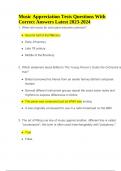
-
Music Appreciation Exam Questions With Correct Answers Latest Updated 2024 (GRADED)
- Exam (elaborations) • 26 pages • 2024
-
Available in package deal
-
- $17.99
- + learn more
Music Appreciation Exam Questions With Correct Answers Latest Updated 2024 (GRADED) When did music for solo piano become common? ● Second half of the 18 th century ● Early 21st century ● Late 15th century ● Middle of the 8th century 2. Which statement about Britten's The Young Person's Guide the Orchestra is true? ● Britten borrowed his theme from an earlier famous British composer: Handel ● Several different instrument groups repeat the exact same notes and rhythms to ex...
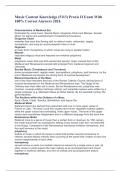
-
Music Content Knowledge (5113) Praxis II Exam With 100% Correct Answers 2024.
- Exam (elaborations) • 5 pages • 2024
-
- $12.99
- + learn more
Music Content Knowledge (5113) Praxis II Exam With 100% Correct Answers 2024. Characteristics of Medieval Era Dominated by vocal music. Sacred Music: Gregorian Chant and Masses. Secular Music: for dance and entertainment (Troubadours/Trouvères) Gregorian Chant melodies that were free flowing with no distinct meter, melismatic, largely monophonic, and sung by unaccompanied voice or choir Organum an early form of polyphony in which voices are sung in parallel motion Masses important r...
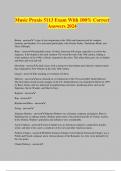
-
Music Praxis 5113 Exam With 100% Correct Answers 2024
- Exam (elaborations) • 37 pages • 2024
- Available in package deal
-
- $14.49
- + learn more
Music Praxis 5113 Exam With 100% Correct Answers 2024 Bebop - answer`a type of jazz originating in the 1940s and characterized by complex harmony and rhythms. It is associated particularly with Charlie Parker, Thelonious Monk, and Dizzy Gillespie. Blues - answermelancholic music of black American folk origin, typically in a twelve-bar sequence. It developed in the rural southern US toward the end of the 19th century, finding a wider audience in the 1940s as blacks migrated to the cities. ...
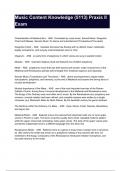
-
Music Content Knowledge (5113) Praxis II Exam Questions And Answers
- Exam (elaborations) • 5 pages • 2024
- Available in package deal
-
- $8.99
- + learn more
Music Content Knowledge (5113) Praxis II Exam Questions And Answers Characteristics of Medieval Era - ANS Dominated by vocal music. Sacred Music: Gregorian Chant and Masses. Secular Music: for dance and entertainment (Troubadours/Trouvères) Gregorian Chant - ANS melodies that were free flowing with no distinct meter, melismatic, largely monophonic, and sung by unaccompanied voice or choir Organum - ANS an early form of polyphony in which voices are sung in parallel motion ...

That summary you just bought made someone very happy. Also get paid weekly? Sell your study resources on Stuvia! Discover all about earning on Stuvia


